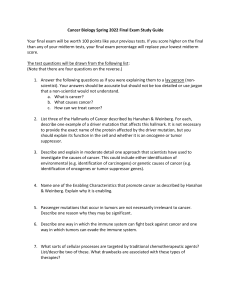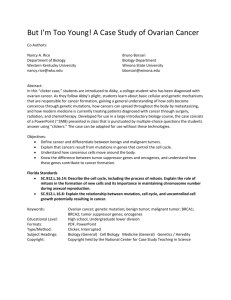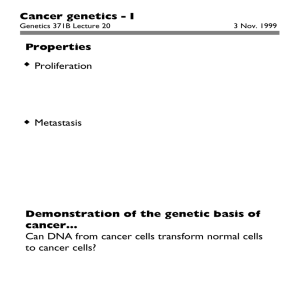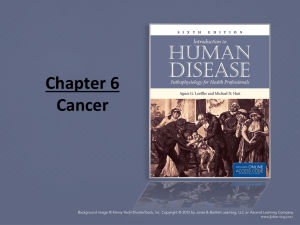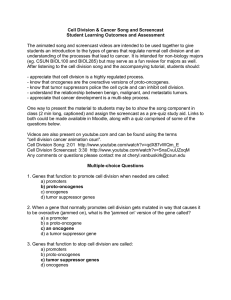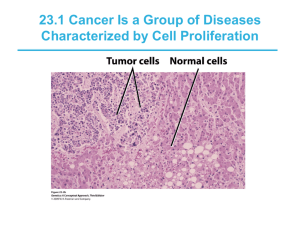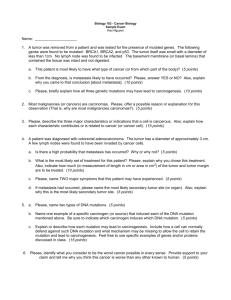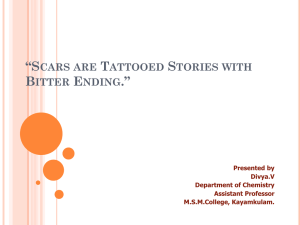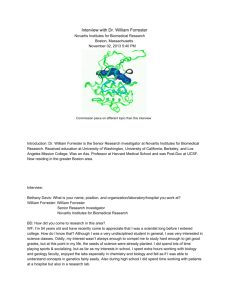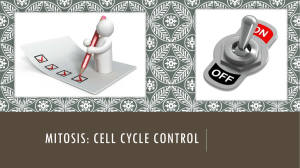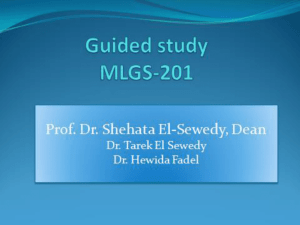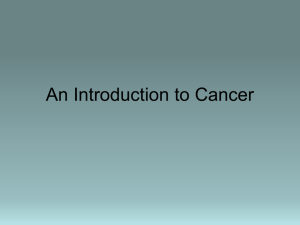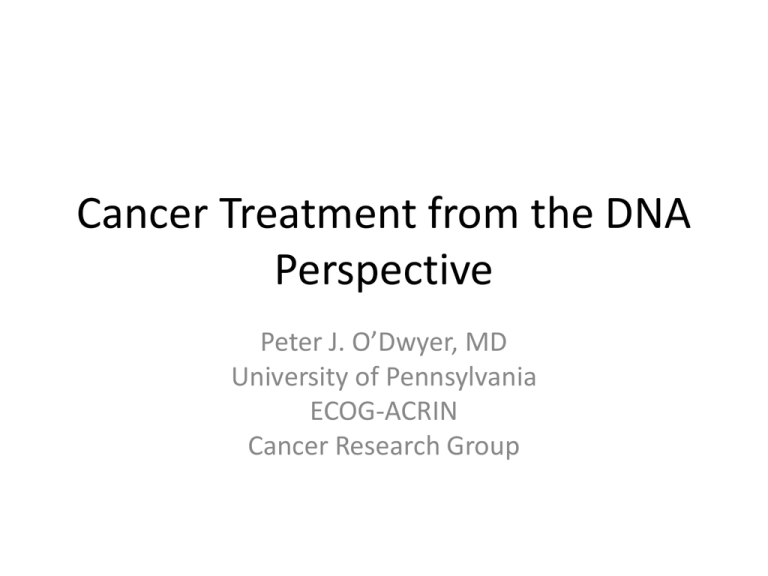
Cancer Treatment from the DNA
Perspective
Peter J. O’Dwyer, MD
University of Pennsylvania
ECOG-ACRIN
Cancer Research Group
DNA Mutation
DNA
CA AG C T A A C T
Normal gene
CA AG C G A A C T
Single base change
CA A G G CG C T A A C T
Additions
C
T
CA A G A A C T
Deletions
Oncogenes
Normal cell
Cancer cell
Mutated/damaged oncogene
Normal
genes
regulate
cell growth
Oncogenes
accelerate
cell growth
and division
Tumor Suppressor Genes
Act Like a Brake Pedal
Tumor Suppressor
Gene Proteins
Growth factor
Receptor
Signaling
enzymes
Cell nucleus
Transcription
factors
DNA
Cell proliferation
Genomics-Driven Trials
• Assumption: Given a specific mutation, a particular
growth or survival pathway will be activated, so
therapy can be directed specifically to it
• Disease-Specific
– Breast Cancer – I-SPY
– Lung Cancer – LUNG-MAP, ALCHEMIST
– Colorectal Cancer – ASSIGN (in development)
• “Disease-Agnostic”
– MATCH
MATCH – Preliminary Hypothesis
Primary:
That tumors that share common somatic genetic
alterations in oncogenes will be variably responsive to
therapies targeting the oncogenic pathway based on
lineage specific factors.
Secondary:
That concomitant somatic genetic alterations will predict
responsiveness or resistance.
6
MATCH TRIAL OVERVIEW
•
•
•
•
Identify mutations/amplifications/translocations in patient
tumor sample - eligibility determination
Assign patient to relevant agent/regimen – single-arm
Phase II design
Need to sequence large numbers of tumors (3000pts) and
need to have large numbers of targeted treatments
Tumor biopsies & sequencing at progression to
investigate resistance mechanisms
– De-identified samples submitted to central labs
– Whole-exome sequencing (research purposes) to detect
non-ambiguous germline variants
Alliance Spring Group Meeting / May 9, 2014
7
MATCH: SCHEMA
Tumor Biopsy
Statistical Considerations
Within each drug-by-mutation category:
Dual Primary Endpoints:
Overall Response Rate 5% vs. 25% or
Progression Free Survival 6 months 15%
(median PFS 2.2 m) vs 35% (median PFS 4 m)
One stage design 31 evaluable patients per arm
ORR = proportion of patients with objective response (PR+CR) on initial
course of study agent
PFS6 = proportion of patients alive and progression free at 6 months
from initiation of study agent
9
CLIA LAB NETWORK
• Genetic platform: Ion Torrent PGM AmpliSeq custom
panel; Oncomine under evaluation
– About 200 genes
– SNV, indel, CNV, targeted translocations
• Immunohistochemical expression of PTEN
• Validation within and across sites: same SOP
• Possibly additional IHC and FISH, if needed
• Lead laboratory: Frederick National Laboratory for
Cancer Research (Williams)
– Competitively chosen lab sites:
• MD Anderson (Hamilton)
• MGH (Iafrate)
• Yale (Sklar)
SUMMARY
• In planning for a year, MATCH slated to open by
end 2014.
• Robust state-of-the-art platform finalized
September 2014
• Agreements close to final with four companies for
genotype-specific drugs
• Strong CTEP-Intergroup collaboration in
developing the trial
• Broad community oncologist and advocate input
refined design
11
NCI MATCH
PARTICIPATION

